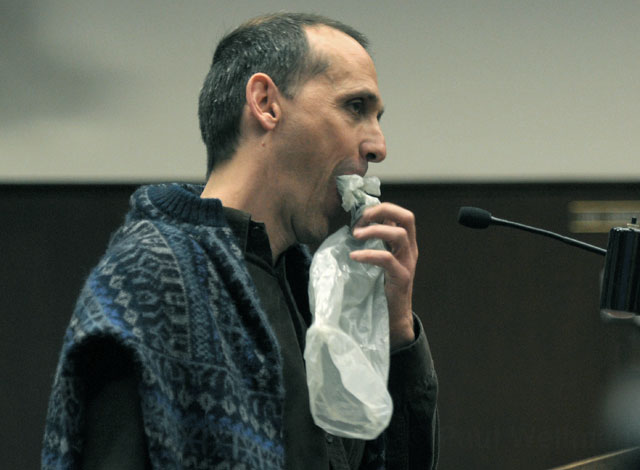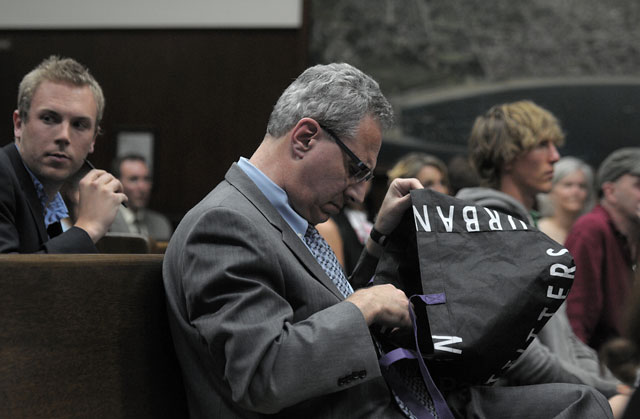Zombie Bag Ban Reanimated
City Moves to Restrict Single-Use Paper and Plastic Carry-Outs

The plodding brute that’s been Santa Barbara’s attempt to limit city stores from distributing onetime-use plastic and paper bags got a jolt of fresh life Tuesday when the council voted to begin working on a new law that would curtail a major source of pollution and litter. The approval to draft an ordinance had escaped City Hall in previous attempts, but bellwether bag-ban laws throughout California that have survived scrutiny and lawsuits convinced the majority of councilmembers that the path is clear.
Spearheading the effort to shift from throwaways to reusables, Mayor Helene Schneider and Councilmember Grant House said the pending ordinance would look to ban all area businesses — grocery markets, liquor stores, clothing retailers, and so on — from providing customers with single-use plastic bags, and would mandate a 10-cent charge to customers for single-use paper bags. (The extra dime per bag goes back to the businesses, and qualifying low-income residents could opt out of the fee.)
Exempt from the ban would be bags for produce, restaurant take-out, newspapers, prescription medications, and dry-cleaning. Reusable bags would be offered at the affected locations, and larger stores — if and when the ordinance is enacted — would have six months to comply. Smaller businesses would be given a year to make the shift. City staff will craft the law’s language in the coming months, looking to the most successful of the 22 California ordinances that didn’t violate state legislation.
During their presentation to the council Tuesday, part of a total three-hour discussion, Penny Owens of Channelkeeper and Kathi King of the Community Environmental Council explained that while the city’s Where’s Your Bag program — designed to encourage residents to carry reusable bags when shopping — succeeded in its educational and advertising campaigns, it failed to gain traction in eight of the 11 businesses that subscribed to it. They said 29 million single-use bags are given out in the city annually, for an average of 325 bags per person per year.
Councilmember Frank Hotchkiss, who’s expressed doubt that plastic and paper bags wreak as much havoc on the environment as many claim, was the first to voice skepticism of the proposed ban. “If I get a hot dog with mustard from 7/11, with chips and a drink, would I be out of luck?” he asked. “For a plastic bag, yes,” replied King. If government gets in the habit of regulating such consumer items, he wondered, what’s next?

The majority of public commenters showed support for the ban, but Hotchkiss found an ally in Stephen Joseph, attorney for the industry-backed Save the Plastic Bag Coalition. First complimenting the council on the fairness of the proceedings, Joseph wondered if there is really a problem to be solved. “I doubt there are very many bags in the ocean from Santa Barbara,” he said.
Joseph said the Save the Plastic Bag Coalition has so far sued three California jurisdictions over their bag laws and will likely file litigation against Carpinteria. That city finalized its complete ban on paper and plastic carryouts Monday, including restrictions on restaurants, despite pointed warning from Joseph a week beforehand that banning bags necessary to transport hot foods poses a safety risk.
State health code preempts local regulations, explained Santa Barbara city attorney Steve Wiley on Tuesday, which puts Carpinteria in a tight spot. The Coalition successfully sued Santa Cruz into rescinding its restaurant bag restrictions. Wiley also noted that litigation filed by a plastic-bag maker against Los Angeles County — contending its fee on paper bags constitutes a hidden tax — goes to L.A. Superior Court Thursday. The outcome of that case will be important to watch, he said.
Before the council passed its final 5-2 vote — with Hotchkiss and Councilmember Randy Rowse dissenting — Councilmember Dale Francisco successfully lobbied that the bag-ban effort be energetically coordinated with member agencies of BEACON (Beach Erosion Authority for Clean Oceans and Nourishment), which include Santa Barbara and Ventura counties and their coastal cities.
The council agreed to try and come up with a model ordinance that member agencies of BEACON — which offered to draft a regional environmental impact report, with interested parties contributing toward the cost — could adopt if they so choose.



